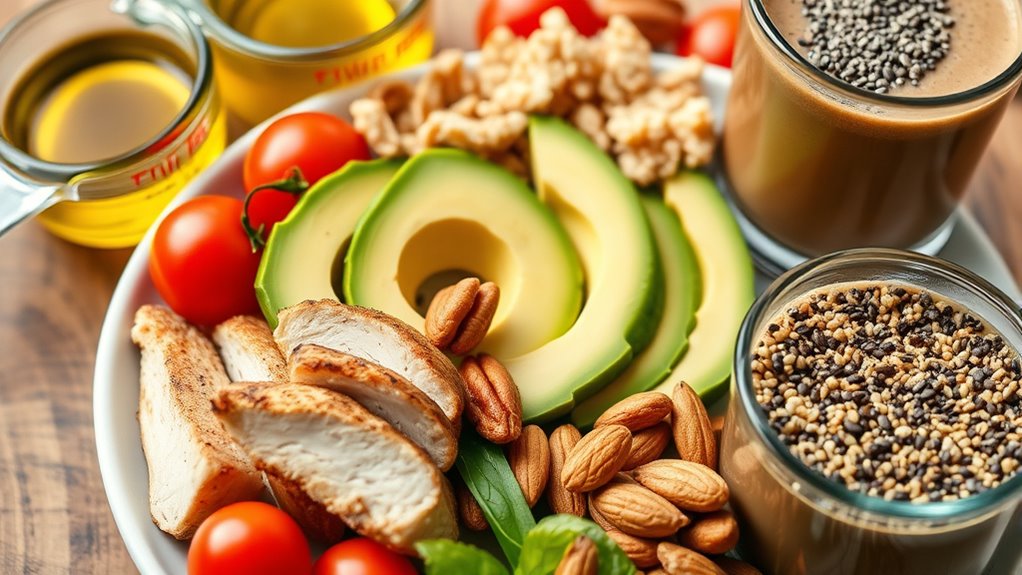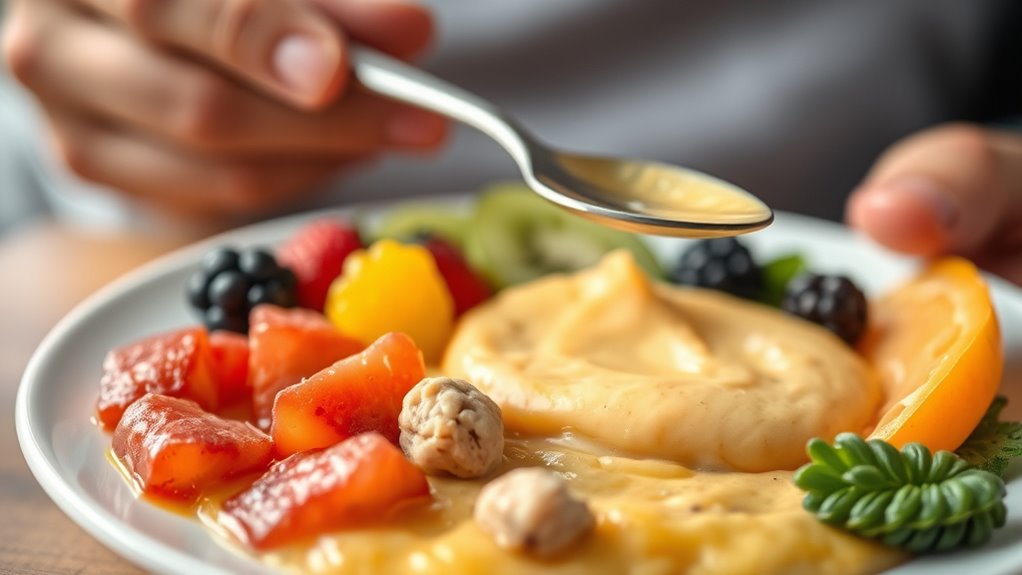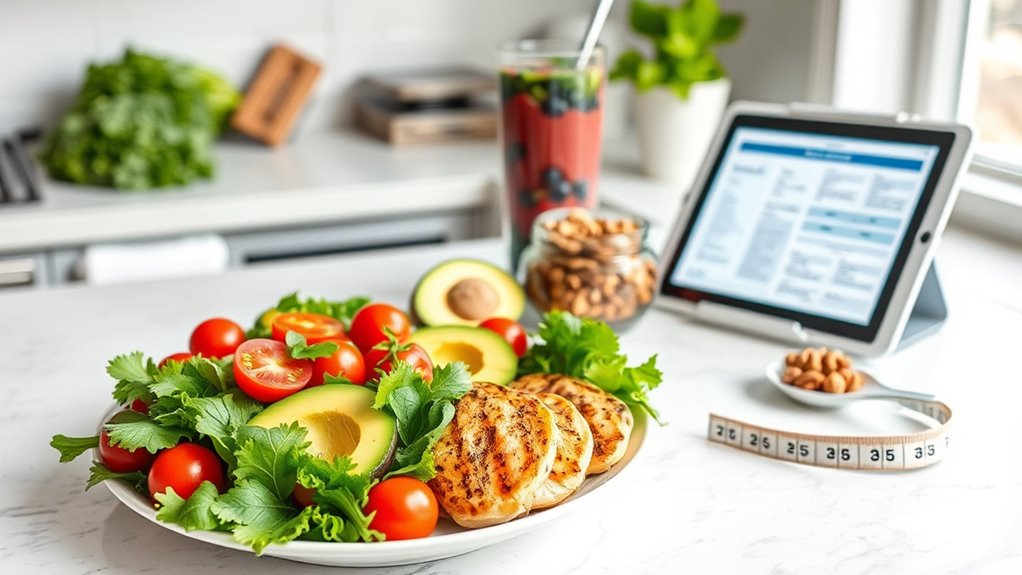To combat weight loss in Parkinson’s, focus on eating small, frequent, calorie-rich meals packed with nutrient-dense foods like healthy fats, colorful vegetables, and whole grains. Improve your appetite by setting regular eating routines, using your favorite flavors, and making meals more appealing. If swallowing is difficult, work with professionals to modify textures and incorporate safe swallowing techniques. Staying proactive with these strategies can help maintain your weight and health—exploring further will provide even more helpful tips.
Key Takeaways
- Incorporate small, frequent, calorie-dense meals and snacks rich in healthy fats, vitamins, and minerals to increase overall caloric intake.
- Use texture modifications like puréed or soft foods combined with safe swallowing techniques to facilitate easier eating and prevent choking.
- Enhance meals with favorite flavors and nutrient-dense ingredients to stimulate appetite and improve food enjoyment.
- Employ technology-assisted tools to optimize food textures and ensure safe swallowing, supporting consistent nutrient intake.
- Establish regular eating schedules and mindful eating practices to help maintain adequate caloric intake and prevent early fullness.
Understanding the Nutritional Challenges of Parkinson’s Disease

Understanding the nutritional challenges of Parkinson’s disease is vital because the condition directly affects how your body processes and absorbs nutrients. Parkinson’s can cause tremors, rigidity, and slowed movements, making eating and swallowing difficult. You might find it hard to coordinate chewing and swallowing, which increases the risk of choking or aspirating food. Additionally, medications for Parkinson’s can interfere with appetite, digestion, and nutrient absorption. Gastrointestinal issues like constipation are common, further complicating nutrient intake. Changes in sense of taste and smell can reduce your desire to eat, leading to unintentional weight loss. Incorporating glycolic acid products into skincare routines can improve skin texture and radiance, which may positively influence self-esteem and overall well-being. To support optimal nutrition, it’s important to consider nutritional supplement strategies that compensate for intake difficulties and absorption issues. Developing tailored nutritional approaches that address nutrient absorption issues can help ensure you meet your daily caloric and nutritional needs. Furthermore, engaging with a healthcare team that specializes in nutritional management can provide personalized guidance and improve outcomes. Understanding specific dog breeds like the loyal and helpful Paw Patrol dog names can inspire motivation for maintaining a balanced diet. These combined factors make it essential to develop tailored nutritional strategies that guarantee you get enough calories and essential nutrients to maintain your health and energy levels.
Optimizing Calorie Intake for Weight Maintenance

To maintain a healthy weight with Parkinson’s, it’s essential to focus on optimizing your calorie intake, especially since the disease can lead to unintentional weight loss. You need enough energy to support daily activities and preserve muscle mass. Track your meals and identify areas where calories can be increased without feeling overly full. Incorporate small, frequent meals and nutrient-rich snacks to boost intake comfortably. Remember, every bite counts in maintaining your strength and stamina. Additionally, understanding the importance of calorie intake can help you make informed dietary choices. Regularly reviewing your personal finance management strategies can also assist in budgeting for nutritious foods and supplements necessary for your health. Being aware of juice cleansing benefits might inspire you to include nutrient-dense beverages that support your dietary goals. Incorporating mindful eating practices can further enhance your ability to meet your nutritional needs without discomfort. Developing a meal planning routine can also help ensure consistent, balanced nutrition throughout the day.
Incorporating Nutrient-Dense Foods Into Daily Meals

Incorporating nutrient-dense foods into your daily meals is essential for supporting energy levels and preventing weight loss in Parkinson’s. Focus on adding foods rich in vitamins, minerals, and healthy fats, such as avocados, nuts, seeds, lean meats, and dairy. These foods pack more nutrients into smaller portions, helping you maximize calorie intake without feeling full too quickly. Incorporate colorful vegetables like spinach, peppers, and carrots to boost antioxidant intake and support overall health. Whole grains like oats and brown rice provide sustained energy. Don’t forget to include sources of protein at every meal, which help preserve muscle mass. By choosing these nutrient-dense options, you ensure your body gets the essential nutrients it needs to stay energized and combat weight loss effectively.
Strategies to Improve Appetite and Eating Habits

Since appetite can diminish with Parkinson’s, adopting specific strategies can help you eat more consistently and comfortably. Try eating smaller, more frequent meals throughout the day to prevent feeling overwhelmed or full too quickly. Incorporate your favorite flavors and textures to make meals more appealing, and avoid strong smells that might reduce your desire to eat. Setting a regular eating schedule can create a routine that signals your body when to expect food, helping to stimulate hunger. Additionally, sitting upright during meals supports better digestion and can improve your appetite. Drinking fluids between meals rather than with them prevents fullness that can interfere with your desire to eat. Incorporating local nutritional resources can provide tailored guidance to meet your dietary needs. As automation advances in healthcare and support systems, integrating personalized nutritional guidance can further assist in managing dietary needs. Engaging in mindful eating practices can also help you better recognize your body’s hunger cues and enjoy your meals more fully. Sound therapy has been shown to influence mood and stress levels, potentially supporting appetite stimulation. Being aware of best beaches and their amenities can offer relaxing environments that may enhance your overall well-being and appetite. These simple adjustments can help you maintain a more regular eating pattern and support your nutritional intake.
Managing Swallowing Difficulties and Food Texture Modifications

Many Parkinson’s symptoms can make swallowing difficult, which can interfere with your ability to enjoy meals and get proper nutrition. To manage this, work with your healthcare team to identify safe food textures. You might need to switch to softer, puréed, or chopped foods that are easier to swallow. Using thickening agents can also help control swallowing safety. Pay attention to portion sizes and take small bites, chewing thoroughly. Sit upright during meals and remain upright for at least 30 minutes afterward to prevent choking or reflux. Avoid rushing; eat slowly and mindfully. Incorporating nutrient-dense foods can help you meet your nutritional needs despite texture modifications. Additionally, understanding the AI integration in mobile devices can provide innovative tools to customize meal planning and ensure proper nutrition. Recognizing the importance of nutritional management in Parkinson’s care can further support your health and well-being. Being aware of food texture modifications can help you adapt your diet effectively. For example, digital literacy programs for seniors can enhance their ability to utilize digital health tools, making meal planning and health monitoring more accessible. Embracing technology-assisted nutrition can also improve meal consistency and safety. By adjusting food textures and adopting safe swallowing techniques, you can enjoy meals while maintaining proper nutrition.
Frequently Asked Questions
How Can Caregivers Support Nutritional Needs for Parkinson’S Patients?
You can support Parkinson’s patients by helping them plan balanced, high-calorie meals that are easy to eat and digest. Encourage regular eating habits, offer nutrient-rich snacks, and assist with meal preparation to guarantee they get enough calories and nutrients. Also, monitor their weight and hydration levels, and consult healthcare professionals for tailored dietary advice. Your involvement makes a significant difference in maintaining their health and well-being.
Are There Specific Supplements Recommended for Weight Gain in Parkinson’S?
Did you know that up to 50% of people with Parkinson’s experience weight loss? For weight gain, consider supplementing with high-calorie options like ensure or protein shakes, which can help boost your intake. You might also explore omega-3 fatty acids or vitamin D, but always consult a healthcare professional first. These supplements can support your nutritional needs and help counteract weight loss effectively.
What Role Does Hydration Play in Managing Weight Loss?
Hydration plays a key role in managing weight loss because staying well-hydrated supports your overall health and digestion. When you’re dehydrated, you might feel less hungry or have trouble absorbing nutrients, making weight management harder. Drinking enough water helps keep your appetite regulated, boosts your energy levels, and guarantees your body functions at its best. Make it a habit to sip fluids regularly throughout the day to support your weight and health goals.
How Do Medication Timings Affect Dietary Strategies?
You might think medication timings don’t influence your diet, but they actually do. Research shows that taking Parkinson’s meds can impact appetite and digestion, so aligning your meals around medication schedules helps optimize absorption and minimize side effects like nausea or stomach discomfort. By planning your food intake carefully, you guarantee you get proper nutrition, maintain energy levels, and support your overall health while managing your medication regimen effectively.
Can Physical Activity Influence Nutritional Status in Parkinson’S?
You can considerably influence your nutritional status through physical activity. Regular exercise helps maintain muscle mass, boosts your appetite, and improves digestion. It also enhances your overall energy levels, making it easier to eat balanced meals. By staying active, you support your body’s ability to absorb nutrients effectively and prevent weight loss. Incorporate activities suited to your abilities, and consult your healthcare provider to develop a safe, effective exercise plan tailored to your needs.
Conclusion
Remember, your nutrition plays a crucial role in managing Parkinson’s. By focusing on calorie-dense, nutrient-rich foods and adapting your eating habits, you can help maintain your weight and strength. Don’t forget to address swallowing issues and keep your meals appealing. As the saying goes, “You are what you eat,” so prioritize nourishing your body to stay as healthy and active as possible. Small, consistent efforts make a big difference in your journey.









